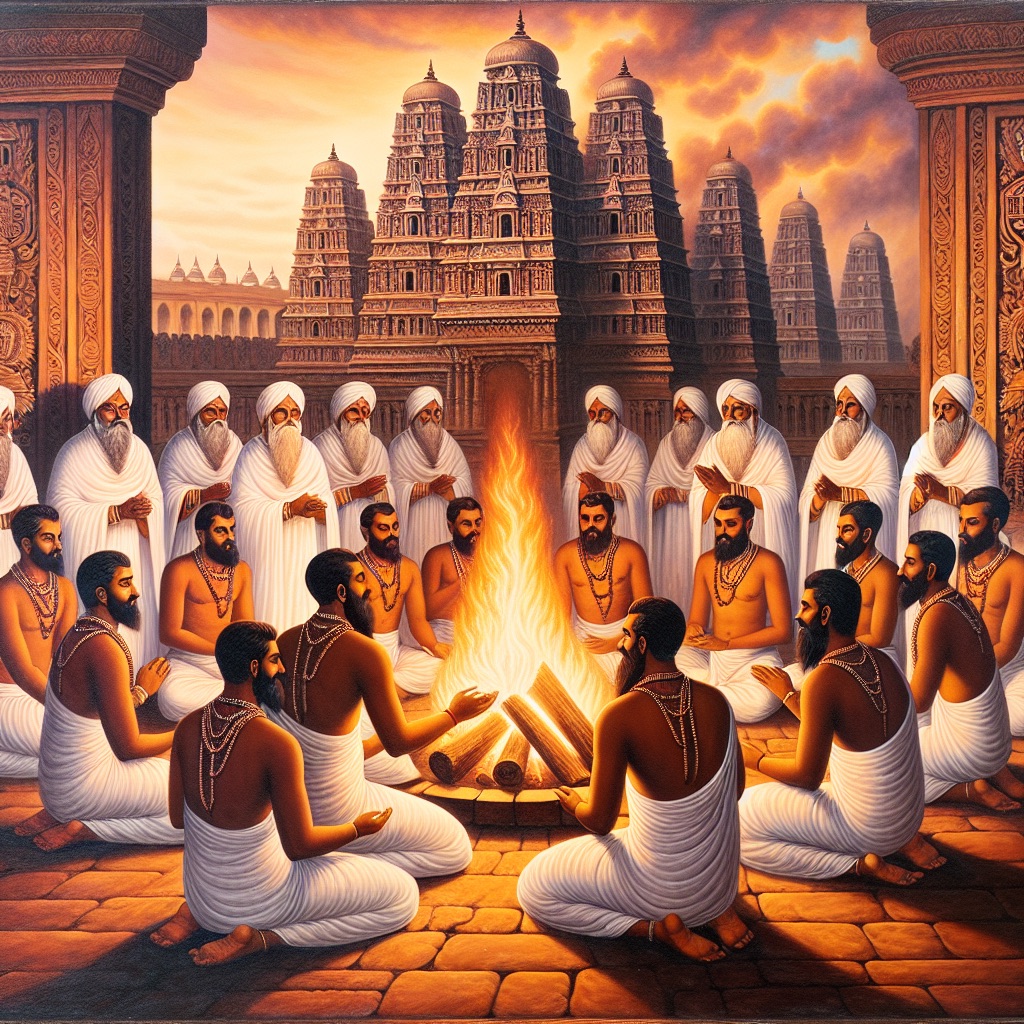1.3.28
Now therefore the edifying repetition (Abhyāroha) only of the hymns called Pavamānas. The priest called Prastotṛ indeed recites the Sāman. ‘While he recites it, these Mantras are to be repeated: From evil lead me to good. From darkness lead me to light. From death lead me to immortality. When the Mantra says, ‘From evil lead me to good,’ ‘evil’ means death, and ‘good’ immortality, so it says, ‘From death lead me to immortality, i.e. make me immortal.’ When it says, ‘From darkness lead me to light,’ ‘darkness' means death, and ‘light,’ immortality; so it says, ‘From death lead me to immortality, or make me immortal.’ In the dictum, ‘From death lead me to immortality,’ the meaning does not seem to be hidden. Then through the remaining hymns (the chanter) should secure eatable food for himself by chanting. Therefore, while they are being chanted, the sacrificer should ask for a boon—anything that he desires. Whatever objects this chanter possessed of such knowledge desires, either for himself or for the sacrificer, he secures them by chanting. This (meditation) certainly wins the world (Hiraṇyagarbha). He who knows the Sāman (vital force) as such has not to pray lest he be unfit for this world.
-
अथातः
athātaḥ —
-
पवमानानामेवाभ्यारोहः
pavamānānāmevābhyārohaḥ —
-
स
sa —
-
वै
vai —
-
खलु
khalu —
-
प्रस्तोता
prastotā —
-
साम
sāma —
-
प्रस्तौति
prastauti —
-
स
sa —
-
यत्र
yatra —
-
प्रस्तुयात्
prastuyāt —
-
तदेतानि
tadetāni —
-
जपेत्—असतो
japet—asato —
-
मा
mā —
-
सद्गमय
sadgamaya —
-
तमसो
tamaso —
-
मा
mā —
-
ज्योतिर्गमय
jyotirgamaya —
-
मृत्योर्मामृतं
mṛtyormāmṛtaṃ —
-
गमयेति
gamayeti —
-
स
sa —
-
यदाहासतो
yadāhāsato —
-
मा
mā —
-
सद्गमयेति
sadgamayeti —
-
मृत्युर्वा
mṛtyurvā —
-
असत्
asat —
-
सदमृतम्
sadamṛtam —
-
मृत्योर्मामृतं
mṛtyormāmṛtaṃ —
-
गमय
gamaya —
-
अमृतम्
amṛtam —
-
मा
mā —
-
कुर्वित्येवैतदाह
kurvityevaitadāha —
-
तमसो
tamaso —
-
मा
mā —
-
ज्योतिर्गमयेति
jyotirgamayeti —
-
मृत्युर्वै
mṛtyurvai —
-
तमः
tamaḥ —
-
ज्योतिरमृतम्
jyotiramṛtam —
-
मृत्योर्मामृतं
mṛtyormāmṛtaṃ —
-
गमय
gamaya —
-
अमृतं
amṛtaṃ —
-
मा
mā —
-
कुर्वित्येवैतदाह
kurvityevaitadāha —
-
मृत्योर्मामृतं
mṛtyormāmṛtaṃ —
-
गमयेति
gamayeti —
-
नात्र
nātra —
-
तिरोहितमिवास्ति
tirohitamivāsti —
-
अथ
atha —
-
यानीतराणि
yānītarāṇi —
-
स्तोत्राणि
stotrāṇi —
-
तेष्वात्मनेऽन्नाद्यमागायेत्
teṣvātmane'nnādyamāgāyet —
-
तस्मादु
tasmādu —
-
तेषु
teṣu —
-
वरं
varaṃ —
-
वृणीत
vṛṇīta —
-
यं
yaṃ —
-
कामं
kāmaṃ —
-
कामयेत
kāmayeta —
-
तम्
tam —
-
स
sa —
-
एष
eṣa —
-
एवंविदुद्गातात्मने
evaṃvidudgātātmane —
-
वा
vā —
-
यजमानाय
yajamānāya —
-
वा
vā —
-
यं
yaṃ —
-
कामं
kāmaṃ —
-
कामयते
kāmayate —
-
तंआगायति
taṃāgāyati —
-
तद्धैतल्लोकजिदेव
taddhaitallokajideva —
-
न
na —
-
हैवालोक्यताया
haivālokyatāyā —
-
आशास्ति
āśāsti —
-
य
ya —
-
एवमेतत्साम
evametatsāma —
-
वेद
veda —

